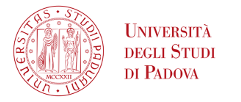
“Global observables and infinite mixing”
Tuesday, December 10, 2019, 11:00 - Aula Seminari 430 - Marco Lenci (Bologna)
Abstract
Roughly speaking, mixing is the property of a dynamical system whereby the dynamics tends to “mix up”, or randomize, trajectories. When a finite reference measure exists, the natural formulation of mixing coincides with the decay of correlations (in time) of the observables of the system. In the case of an infinite reference measure, the standard definition—a.k.a. finite mixing—is inapplicable. Finding an effective replacement—infinite mixing—is a fundamental, and debated, question. The (few) definitions that have been attempted in the past use “local observables”, that is, functions that essentially only see finite portions of the phase space. We introduce the concept of “global observable”, a function that represents a certain quantity throughout the phase space. This concept is based on the notion of infinite-volume average, which is inspired by statistical mechanics (which is, after all, the field of mathematical physics that has most successfully dealt with extended systems). Endowed with the notions of global and local observables, we give a few definitions of infinite mixing. These fall in two categories: global-global mixing, which expresses the “decorrelation” of two global observables, and global-local mixing, where a global and a local observable are considered instead. We will discuss these definitions and, time permitting, see how they respond on different kinds of infinite-measure-preserving dynamical systems.




